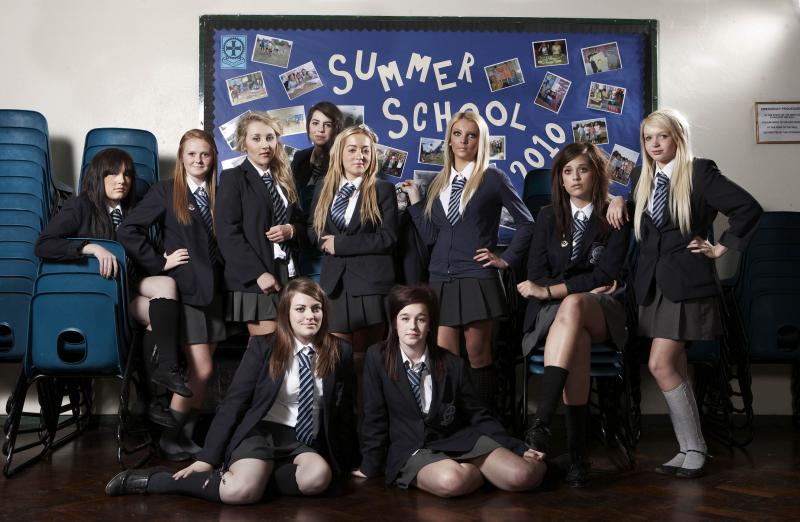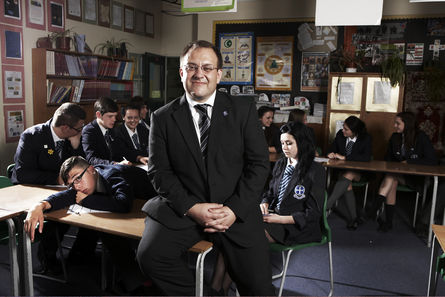Educating Essex, Channel 4 | reviews, news & interviews
Educating Essex, Channel 4
Educating Essex, Channel 4
Fly-on-the-blackboard documentary about secondary school life

Education, education, education. Have we ever worried so much about how, and what, and why, and where our children are being taught? We’re so desperate, it seems, for some guidance on the matter that we barely raise an eyebrow about turning their trials and tribulations into fodder for reality television. Never mind the dubious ethics, we might learn something.
Educating Essex is a seven-part fly-on-the-blackboard documentary examining life for the teachers and Year 11 pupils at Passmores Secondary School in Harlow, Essex. The access, we were told, was impressive. I could think of some other words for it. Sixty-five fixed cameras captured every detail of life in the school from the corridors to the canteen, the head teacher’s office to the detention hall. This was basically Big Brother offering a sideline in GCSEs.
What we didn’t see much of, at least last night, was the classroom. The opening episode was all about discipline rather than teaching, meaning the action centred around deputy head Stephen Drew (pictured below), self appointed “gatekeeper” on the front line between staff and pupils. “I’m going to be the brick wall,” he intoned in the kind of flatlining sing-song voice that used to announce that the 16.25 from Faversham would shortly be arriving at Victoria. “What [the pupil] wants to do is on the other side of that wall and I am afraid I am the brick wall and you’re not getting past.”
 Described by head teacher Mr Goddard as a “little sergeant major”, Drew wasn’t, shall we say, entirely unappreciative of the attentions of a camera crew. Yet he was clearly the engine that drove the school forward (or at least stopped it from stalling), sitting at his desk, his mouth filled with Pogues lyrics and mini Weetabix, never happier than when engaged in Hoody Patrol.
Described by head teacher Mr Goddard as a “little sergeant major”, Drew wasn’t, shall we say, entirely unappreciative of the attentions of a camera crew. Yet he was clearly the engine that drove the school forward (or at least stopped it from stalling), sitting at his desk, his mouth filled with Pogues lyrics and mini Weetabix, never happier than when engaged in Hoody Patrol.
Inevitably the camera generally lingered on his contretemps with troublesome pupils rather than the dull old do-gooders. Drew had a slightly paternal relationship with problematic Charlotte, whose pitch-perfect rendition of the genus Stroppy Teen seemed to have arrived straight from the editing suite of The Catherine Tate Show: “OMIGODletmesitontheflooritdontbovverme,” she wailed at one of a million perceived slights.
Watching Charlotte’s difficulties with school life served up as entertainment, one couldn’t help but question the good sense in allowing cameras into the school. Drew worried that we would watch this programme and think that he and his fellow teachers were “a bunch of fucking idiots”. I didn’t think that. Passmores is clearly not a bad school (it's rated "outstanding" by Ofsted) and Drew is obviously a committed teacher, but so-called reality TV is merciless in pursuing its own ends; ultimately it can’t help but reduce everyone it touches to light-entertainment archetypes. Thus Drew was cast somewhere between David Brent and Captain Mainwaring, while Goddard appeared to be on secondment from CBeebies: when he wasn't jumping out from behind doors to spook his deputy, he was bursting into his classroom flourishing a cake and singing “you look like a monkey and you smell like one, too” to the tune of “Happy Birthday”, as a group of deeply embarrassed 15 and 16-year-olds examined their finger nails.
Not only does television shrink real life, but real life starts to willingly bend to fit the confines of the camera. A minor set-to over a hoody – what else? – between bad lass Carmelita, Mr Drew and a blundering, bifro-ed English teacher (think Simon Callow crossed with Stephen Mangan) seemed slightly stage-managed. The irony of checking on-site CCTV footage to substantiate a trumped-up claim of “assault” when there were five dozen cameras capturing every flicker of school life didn’t seem to occur to anyone, but it did confirm that the programme-makers demanded a dramatic climax, however contrived. In the end, any emotion or event that couldn’t be telegraphed via an uplifting blast of Snow Patrol or a glowering dose of sub-Portishead atmospherics had no business being here.
The programme did hit on a few issues, not least the “catastrophic” impact of mobile phones on young people’s attention spans. There was also, perhaps as expected, a lot of soul-searching about exclusion being “morally unacceptable” and how every bad kid had a great kid just bursting to get out. What Educating Essex really re-enforced, however, was the terrible lack of clarity surrounding the teacher's role in 2011. Drew talked regretfully about the barely tangible generation gap and vanishing lines of discipline. We saw teachers getting hit by snowballs in the playground and not knowing whether to grin or combust. The tone was one of forced mateyness mixed with withering sarcasm and talk-to-the-hand attempts at overbearing authority, grist to the mill for those who believe we have lost the ability to communicate effectively with our children.
But we already know all this, don’t we? Educating Essex was often very funny ("What is Pi? Where did it come from?"), it was warm and undeniably good telly, but ultimately it offered little to suggest that our children and most valuable public sector workers weren't being shrunk to amusing bite-sized caricatures for entertainment rather than elucidation. In the six episodes to come, Educating Essex may end up telling us something startling and important about education in the UK in 2011. But it has told us next to nothing so far.
Share this article
Add comment
The future of Arts Journalism
You can stop theartsdesk.com closing!
We urgently need financing to survive. Our fundraising drive has thus far raised £49,000 but we need to reach £100,000 or we will be forced to close. Please contribute here: https://gofund.me/c3f6033d
And if you can forward this information to anyone who might assist, we’d be grateful.

Subscribe to theartsdesk.com
Thank you for continuing to read our work on theartsdesk.com. For unlimited access to every article in its entirety, including our archive of more than 15,000 pieces, we're asking for £5 per month or £40 per year. We feel it's a very good deal, and hope you do too.
To take a subscription now simply click here.
And if you're looking for that extra gift for a friend or family member, why not treat them to a theartsdesk.com gift subscription?
more TV
 Blu-ray: The Sweeney - Series One
Influential and entertaining 1970s police drama, handsomely restored
Blu-ray: The Sweeney - Series One
Influential and entertaining 1970s police drama, handsomely restored
 I Fought the Law, ITVX review - how an 800-year-old law was challenged and changed
Sheridan Smith's raw performance dominates ITV's new docudrama about injustice
I Fought the Law, ITVX review - how an 800-year-old law was challenged and changed
Sheridan Smith's raw performance dominates ITV's new docudrama about injustice
 The Paper, Sky Max review - a spinoff of the US Office worth waiting 20 years for
Perfectly judged recycling of the original's key elements, with a star turn at its heart
The Paper, Sky Max review - a spinoff of the US Office worth waiting 20 years for
Perfectly judged recycling of the original's key elements, with a star turn at its heart
 The Guest, BBC One review - be careful what you wish for
A terrific Eve Myles stars in addictive Welsh mystery
The Guest, BBC One review - be careful what you wish for
A terrific Eve Myles stars in addictive Welsh mystery
 theartsdesk Q&A: Suranne Jones on 'Hostage', power pants and politics
The star and producer talks about taking on the role of Prime Minister, wearing high heels and living in the public eye
theartsdesk Q&A: Suranne Jones on 'Hostage', power pants and politics
The star and producer talks about taking on the role of Prime Minister, wearing high heels and living in the public eye
 King & Conqueror, BBC One review - not many kicks in 1066
Turgid medieval drama leaves viewers in the dark
King & Conqueror, BBC One review - not many kicks in 1066
Turgid medieval drama leaves viewers in the dark
 Hostage, Netflix review - entente not-too-cordiale
Suranne Jones and Julie Delpy cross swords in confused political drama
Hostage, Netflix review - entente not-too-cordiale
Suranne Jones and Julie Delpy cross swords in confused political drama
 In Flight, Channel 4 review - drugs, thugs and Bulgarian gangsters
Katherine Kelly's flight attendant is battling a sea of troubles
In Flight, Channel 4 review - drugs, thugs and Bulgarian gangsters
Katherine Kelly's flight attendant is battling a sea of troubles
 Alien: Earth, Disney+ review - was this interstellar journey really necessary?
Noah Hawley's lavish sci-fi series brings Ridley Scott's monster back home
Alien: Earth, Disney+ review - was this interstellar journey really necessary?
Noah Hawley's lavish sci-fi series brings Ridley Scott's monster back home
 The Count of Monte Cristo, U&Drama review - silly telly for the silly season
Umpteenth incarnation of the Alexandre Dumas novel is no better than it should be
The Count of Monte Cristo, U&Drama review - silly telly for the silly season
Umpteenth incarnation of the Alexandre Dumas novel is no better than it should be
 The Narrow Road to the Deep North, BBC One review - love, death and hell on the Burma railway
Richard Flanagan's prize-winning novel becomes a gruelling TV series
The Narrow Road to the Deep North, BBC One review - love, death and hell on the Burma railway
Richard Flanagan's prize-winning novel becomes a gruelling TV series
 The Waterfront, Netflix review - fish, drugs and rock'n'roll
Kevin Williamson's Carolinas crime saga makes addictive viewing
The Waterfront, Netflix review - fish, drugs and rock'n'roll
Kevin Williamson's Carolinas crime saga makes addictive viewing

Comments
Terrible program -
Am I very pedantic to wonder
Am I very pedantic to wonder whether teacher Anonymous of Harlow with that dodgy punctuation and lack of an apostrophe is much better than the targets? Back to school with you.
I thought it was good telly
I am an ex resident of Harlow
Unfortunately, this school is
As a parent of 2 children who
I was very disappointed with
We've already sat through